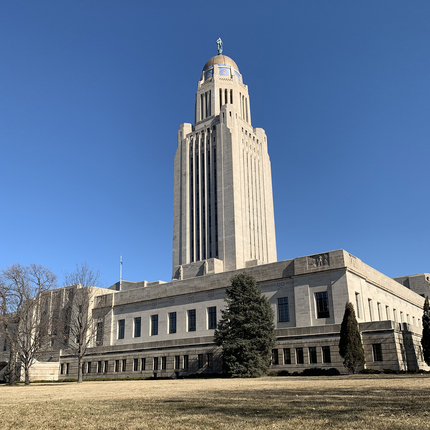By Johnathan Hladik, former policy director
Elected representatives in Nebraska will debate a host of issues during the 2023 legislative session, including appropriations, budget and tax, economic development, energy and environment, and family economic security.
Relevant developments concerning priority legislation will be shared via email. Visit cfra.org/signup or email [email protected] for updates.
What do you think?
Let us know your input on these priorities and tell us about other state issues that are important to you. Are you interested in writing a letter to your legislator or even testifying at the state capitol? Let us know.
Appropriations
This year is a budget year, meaning a substantial portion of the legislative calendar will be devoted to developing and approving appropriations for the next biennium.
Our primary objective is to advocate for strong funding and support for Business Innovation Act (BIA) programming. And, continue funding for the Independent Processor Assistance Program (IPAP), which was funded last year. Approximately half of that allocation remains unspent.
We will also look for opportunities to advance health care and economic security priorities. Tax revenues have been higher than expected and federal stimulus money remains available, which could provide an opening for unexpected gains.
Budget and tax
Despite several sessions of incremental progress, there remains a near-universal consensus that comprehensive tax reform is needed. The spotlight is again on property taxes, especially in rural parts of the state. This always-dominant issue is typically more salient coming off an election year as many candidates campaign on making it their number one priority. In 2023, this promise will collide with an invigorated attempt to set aside a portion of tax revenue for tuition costs at private schools.
Rural areas continue to suffer from the state’s unbalanced approach to school funding. Because rural districts receive a small fraction of the state equalization aid afforded to their urban counterparts, the prospect of stretching property tax dollars even further is alarming. Rural stakeholders need to be engaged in this debate.
Economic development
Unfortunately, confused and outdated mobile food unit regulations are an industry challenge. Each of Nebraska’s 529 municipalities and 93 counties can, and often do, enact their own set of rules. The Nebraska Department of Agriculture, the primary permitting agency, finds its own inspectors interpreting guidelines differently among the 15 inspection zones it manages. Regulatory reform is needed to give these entrepreneurs a fair shot.
We have heard from first-time entrepreneurs with culinary skills who find mobile food units as appealing alternatives, as the capital required to open a new restaurant in a brick and mortar location can be prohibitive. Opting for a food truck first allows entrepreneurs to test their product at a smaller scale, and transition the business to a more permanent location once their idea proves a success.
Energy and environment
Frustration with net metering policy is growing across rural Nebraska. Many farms and businesses are eager to take advantage of federal incentives to install distributed generation systems. At the same time, a large number of public power districts have reached the 1% threshold. Once a public power district receives at least 1% of their power from distributed generation sources, they are allowed to reimburse net metering customers at the avoided cost of generation. This lower rate is not economically feasible for most customers.
A comprehensive bill to rewrite the state’s net metering policy may be out of reach this session. Individual bills tackling smaller pieces of this puzzle are more likely to be introduced. We will support these efforts while continuing to push for reform.
Family economic security
During the 2021 session, we teamed with stakeholders across Nebraska to pass a bill that lowered the gross income eligibility limit tied to the Supplemental Nutrition Assistance Program (SNAP) from 130% to 165%. Unfortunately, this change is set to expire on Oct. 1, 2023.
Community members across rural Nebraska will lose food assistance if the legislature does not act this session. Combined with higher food costs and an uncertain economy, this loss of benefits will cause real hardship for families struggling to make ends meet.





